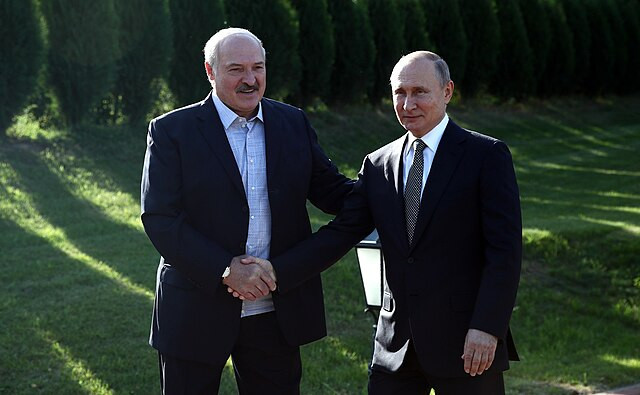Russian President Vladimir Putin on Friday deepened Moscow's military ties with its closest ally, Belarus, signing a treaty offering security guarantees that include the potential use of Russian nuclear weapons to repel aggression. The pact, signed during Putin's visit to Minsk, underscores escalating tensions between Russia and the West amid the ongoing conflict in Ukraine.
"I'm sure that the treaty will ensure the security of Russia and Belarus," Putin said during televised remarks alongside Belarusian President Alexander Lukashenko. The agreement formalizes the deployment of Russian tactical nuclear weapons in Belarus, with Putin emphasizing that their use would respond to threats to the sovereignty of either nation.
Belarus' inclusion under Russia's nuclear umbrella follows Putin's recent revision of Moscow's nuclear doctrine, which lowered the threshold for nuclear weapon use and extended guarantees to Belarus. The doctrine allows nuclear strikes in response to the use of weapons of mass destruction or conventional aggression threatening the territorial integrity of Russia or Belarus.
Lukashenko called for further military reinforcements from Russia, requesting the deployment of advanced Oreshnik intermediate-range ballistic missiles to Belarus. "I would like to publicly ask you to deploy new weapons systems, primarily Oreshnik, to Belarus," he said, claiming that such weapons would "help calm some heads."
Putin confirmed that the missiles, capable of carrying conventional or nuclear warheads, could be deployed by the second half of next year. However, he stressed that control over their use would remain with Moscow. The Oreshnik missile, which Putin said is immune to existing air defense systems, has a range sufficient to strike any target in Europe.
The treaty's signing was condemned by Belarusian opposition figures, who view the agreement as further eroding the nation's sovereignty. "Putin's visit to Minsk isn't about security, it's about Russia tightening control over our country," said Sviatlana Tsikhanouskaya, the Belarusian opposition leader-in-exile. She called the deal a dangerous step that uses Belarus as "a pawn in [Putin's] imperial ambitions" and "threatens us all."
Franak Viačorka, senior adviser to Tsikhanouskaya, described the pact as "another betrayal of Belarusian independence." In a statement to Newsweek, he said the agreements signed during Putin's visit cement Belarus' role as "a militarized satellite of Russia." He urged the international community to reject the treaty, arguing it exposes Belarusians to heightened risks of military escalation.
The Institute for the Study of War (ISW) characterized the agreement as part of Moscow's strategic push to expand its military footprint in Belarus and de facto annex the country through the Union State framework. The ISW noted that Lukashenko's requests for control over Russian-deployed weapons in Belarus reflect ongoing efforts to preserve sovereignty, though such attempts have historically failed.
Belarus' military alignment with Russia has intensified since Lukashenko allowed Russian forces to use Belarusian territory as a launchpad for the February 2022 invasion of Ukraine. Tactical nuclear weapons were later stationed in Belarus under a deal that kept them under Russian control but required Lukashenko's sanction for their use.
The security pact arrives amid heightened nuclear rhetoric from Moscow, with Putin touting the capabilities of the Oreshnik missile. In November, Russia used the missile against Ukraine, which Putin claimed was retaliation for attacks on Russian military facilities using Western-supplied weapons. He warned that the missile could also be used against facilities in NATO member states aiding Ukraine.
Despite the growing military collaboration, Belarus' opposition insists that such moves isolate the country further from the West and deepen its dependence on Moscow. "By aligning so closely with Putin, [Lukashenko] burns chances to drag Belarus out of Russian claws," Viačorka said.




